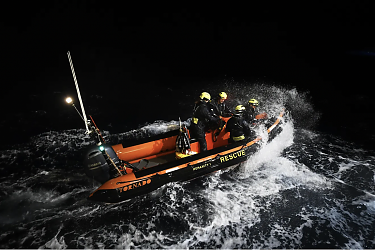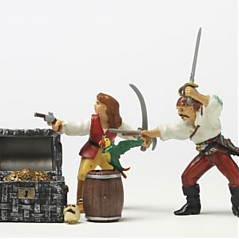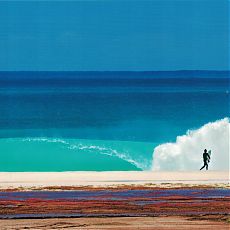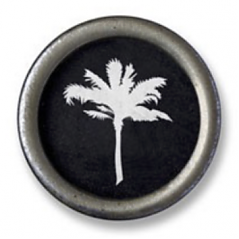The Litfaß Polka
A brief history of anti-clutter campaigns.

November 2005
On a bright summer morning in Berlin a century and a half ago, to the tune of a polka written for the occasion, Germans in top hats and tails turned out to watch a publisher and businessman named Ernst Litfass unveil his first batch of billboard-pillars, which were going to solve the problem of ugly ad posters and political pamphlets cluttering his beautiful Prussian city. Overnight, “in a concentrated action by police and volunteers,” writes Reinhard Wahren in a little book about the columns, “all remains of old bills and placards were torn and scrubbed from houses, fences, and trees.” Even local newspapers praised the new street furniture — a brilliant innovation to Berliners in 1855 — for its role in cleansing the streets.
This story is worth revisiting because a fashion for organizing newspapers into neat city-organized racks has been sweeping American cities. Not just Cambridge but Chicago, L.A., San Francisco, Denver, and Dallas — never mind smaller towns from Florida to Hawaii — have all warmed to the idea of tightening control over newspaper distribution for the sake of prettifying streets. San Francisco has installed “fancy racks ” to replace the unsightly gaggle of different newsracks on every corner; Cambridge has a handful of proposed laws aimed at battling clutter. In every case, whether the mayors know it or not, the forefather of these prettification projects is Ernst Litfass.

His columns came to Berlin only after Prussian soldiers quashed a street revolution in 1848. The labor uprisings that erupted across Europe that year had been encouraged in Berlin by ugly fliers — sarcastic, sometimes rhyming anti-government posters that laid out complaints by the city’s poor and unemployed. The posters, like the revolution, disturbed the city fathers who thought their lower classes were content, and after a few rioters had been shot, a barking authoritarian named Ludwig von Hinckeldey ascended to the top police job with a mandate to clean up the streets. He gave a contract for ad columns to a printer named Litfass in 1855.
The columns — which still exist — are nice to look at: simple cylinders with green-painted iron flourishes around the top. They’ve become part of the streetscape and part of the city culture. For a while Berliners called them “Fat Ladies,” and during the war with France in the 1870s people gathered around them in the morning to read official news from the front. Circus, theater, and concert ads give the streets a controlled burst of garish color. Nothing wrong with that. But Litfass’ contract with Berlin amounted to a form of censorship: Suddenly posting anywhere besides a Litfass column was illegal, and Litfass’s firm had private control over what went on the columns.
This monopoly on fly-posting passed from Litfass’s heirs to the city itself in 1880, and the columns’ history is now as checkered as Berlin’s, which is to say they had a bad season under the Nazis, who used the inherited monopoly on fly-posting to spread antisemitism. Photos from the war years show the Fat Ladies misused as propaganda tools, urging Berliners not to shop in Jewish stores.
Of course, Hitler would have done just as well without Litfass columns. But the story is a stark example of how a free society erodes — one grain at a time, for silly reasons. “Anywhere you go in this city,” warned San Francisco Mayor Gavin Newsom last year, speaking for busy bureaucrats across the nation, “you’re going to find news racks out in the middle of the street right there where people should be parking. Tipped over.”

Even though every U.S. mayor has sworn up and down that anti-clutter measures will never be used to control who gets to put out which newspaper where, the new wave of city-beautiful regulations represents another morsel of old-fashioned American freedom given up to local government — along with the freedom, say, to walk down the street without being recorded on city-controlled video, or visit the library without leaving a record for the FBI. Maybe no one’s misusing those powers right now (he said, doubtfully). But every time we hand an insignificant right to even a trusted liberal government we also pile more power into the lap of a nameless future politician, so that one day our descendants may still wake up to a rude surprise, like the grandchildren of those Berliners in top hats 150 years ago, who tapped their feet to a polka and looked forward to a new age of urban tidiness.
Michael Scott Moore

Rafts of the Medusa
Why every day on the Mediterranean is a new scandal for Europe. For both Foreign Policy and Die Zeit.
California’s Attempt at Land Reparations
How land seized from a Black family 100 years ago may be returned. The Bruce’s Beach story from a hometown angle, for The New Yorker
Day of the Oprichnik, 16 Years Later
The novelist Sorokin, the president Putin, his man Dugin, and the war in Ukraine. For n + 1.

The Rushdie Narrative
Knife and the crumbling ground beneath free speech
There Must Be Some Way Out of Here
An essay on Bob Dylan, “All Along the Watchtower,” and Somali pirate captivity.
That Mystic Shit
The life of Lou Reed in two biographies

Cambodian Seafarers Talk About Pirates
Mike visits Cambodia for The New Yorker to talk about a harrowing shared experience in Somalia
The Muslim Burial
Cambodian hostages remember digging a grave for one of their own. A sequel chapter to The Desert and the Sea
The Real Pirates of the Caribbean
Adventure journalism in Southern California. A travel essay for The Paris Review.

Antifa Dust
An essay on anti-fascism in Europe and the U.S., for the Los Angeles Review of Books
Was Hitler a Man of the Left?
A book that helped Republicans in America lose their damn minds.
Ghosts of Dresden
The Allied firebombing of Dresden in 1945 destroyed the baroque center of what Pfc. Kurt Vonnegut called, in a letter home from Germany, “possibly the world’s most beautiful city.”

George Freeth, Biographed
The first academic treatment of America’s surf pioneer. Also, was Freeth gay?
It’s Called Soccer
Americans live on what amounts to an enormous island, defended on two shores by the sea, and we’ve evolved a few marsupial traditions that nobody else understands.
Tilting at Turbines (in the Severn River)
The morning was clear and cold, with frost on the church steeple and the cemetery grass. I had a quick English breakfast at a white-cloth table, in my wetsuit, and drove to Newnham, a village on the Severn River in Gloucestershire, parking near the White Hart Inn.

The Curse of El Rojo
I’d packed the car lightly — a bag of clothes, a bag of cassette tapes, a backpack of books, a few essential tools.

































